Vibe-Coded Product Success Stories Ain't What They Look
CreatorHunter story is not a vibe-coded product success many AI enthusiasts want it to be. It's not remotely as rosy as it was made to look. Yet, we can still learn a lot from it.
I've said it before, and I can repeat:
Can you vibe code a product?
TL;DR: No.
So yes, I'm an easy target for the enthusiasts telling me: "You. Are. Wrong. Here's an actual story of someone doing it. Ha!" That's fine. I'm not trying to convince those in awe of AI capabilities or AI advocates.
My target is people who consider building a digital product (as a startup or within their existing business) and would rather improve their odds of succeeding. By the way, if you’re in such a position, reach out.
Anyway, let's look at a specific story and try to infer what's behind the scenes.
How I Vibe-Coded My Way To Success
One example thrown at me in a recent discussion was CreatorHunter. Here's a video where CreatorHunter founder, Paulius Masalskas, explains how he vibe-coded his way to success when commuting on a train.
The key takeaways are:
He was not a software developer. While he had some prior experience with coding, "he sucked at it."
He hasn't written a line of code. It was all prompted.
He made enough revenue ($30k) to leave his nine-to-five job and focus on CreatorHunter.
First of all, I am impressed with Paulius' journey. His approach to building a product is exactly what we teach most of our clients who'd ideally jump on developing a whole huge thing from the outset.
Instead, CreatorHunter has been a series of relatively small-scale experiments aimed at validating underlying assumptions. I genuinely wish all product development followed that path.
If the reported outcomes are real, which I have doubts about, I'd be inspired too. A five-digit revenue in the first several months is way more than an average startup can count on. Add to this the fact that the founder was working around his very limited tech skills.
What's not to love?
The Numbers
The officially reported total revenue is $30k-$40k, depending on the source. Since Paulius has been working on the app since September 2024, it would be around 9 months of effort till May 2025, when the video was released.
It's around $4k a month.
And that's just revenues. If you discount the costs (admittedly, low), you land not far above the minimum salary for white-collar workers in the US. All that for more work than an average 9-5 hustle, which Paulius admits. As for now, it doesn't all look like a stunning success.
Granted, it's only CreatorHunter's early days. And if the traction curve is exponential, heck, even if it grows linearly, the picture would be all roses soon enough.
However, Paulius claims to have hit $10k mark just days after the launch in November last year. While I don't have access to the numbers, it doesn't suggest any desirable traction dynamics. If anything, it might have declined rather than grown.
Add to that the fact that the initial offer was ‘pay once, get lifetime access’, and there's not much potential for recurring revenues from those earliest users.
The Early Success
In the video, Paulius focuses on the tools he used to vibe code his way to CreatorHunter. He mentions, however, a bit about marketing, too. Namely, his launch tweet, which went viral, with almost half a million pageviews.
Also, many of his tweets get tens of thousands/hundreds of thousands of pageviews. Most definitely, he knows how to do social media outreach.
Now, it's not to dismiss the combination of skill and luck to get that kind of audience for one's launch announcement. I genuinely wish the stuff I write was getting as much readership. Yet, having such an audience at a founder’s fingertips is the difference between the same app remaining completely anonymous and getting the early 100 people willing to risk $100 for lifetime access to a tool that may or may not prove useful.
In this case, that early outreach was even more critical since CreatorHunter is a solution aiming to connect content creators with startup founders. For such a marketplace to work, one needs enough representation from at least two parties (buyers and sellers).
Too few creators and founders will not see the value they're supposed to pay for.
Not enough clients and creators will lose interest in being listed on the platform, or ignore inquiries when they come.
So the difficult trick that Paulius really pulled here was not vibe coding a website, but building enough traffic on both sides of his marketplace. By the way, save for the tweet above, he speaks very little about that part.
I get it, you can't vibe code traction building, so the story is not nearly as appealing. It sounds way more like, “Be continuously active and deliver value to your followership for years, and then you eventually have it.”
A side note: I wouldn't downplay the role of luck in attracting the early traction here. Paulius himself mentions that the virality of his tweet might have been due to people awaiting the early successes of vibe-coded apps.
The (Lack of) Credibility
A disclaimer: I get it; when protyping and validating, we don't necessarily dot all the i's and cross all the t's. By no means do I expect an early-stage startup to get all the formal stuff in place from day one. Yet, at some point, it makes sense to get the basics in place. Especially for a company that wants your credit card number.
I mean stuff like, I don't know, having an actual company name in the privacy policy.
The address is in Singapore, which, by the way, isn't necessarily clear either. But the data owner? It says it's a website that you're on. I wouldn't have figured…
I'm no GDPR expert, but I'm guessing it violates a rule or two.
Let's then talk about what happens when I'm dissatisfied with the product.
The pricing page is explicit. It’s risk-free. "100% money-back guarantee, no questions asked."
The refund policy in Terms of Service disagrees.
So, which one is it? I know which one a lawyer would pick as a defensible strategy.
Anyway, you see such things and you start asking broader questions about credibility. Like, whether the key claim of "I vibe coded an app on a train commute and it got me $30k" is even true.
It doesn't take much digging in Paulius' X feed to get an answer. A 7-day effort wrapped in early November had quite some demoable functionality as early as late September.
At a risk of sounding sarcastic, my calendar works kinda differently.
Again, it's not an attempt to downplay the founder's hard work (even less so, given it was an after-hours hustle for the first few months) or the outcomes. However, it's another eyebrow-raising observation that makes me question any claims that can't be validated. Including those about revenues. Or that 13k+ of creators available on the platform are handpicked. Or that they "vetted millions of creators so you don't have to."
The Vibe Coding Advocate
Imagine that you're building an early-stage product and you hit the jackpot. You've validated Problem-Solution Fit, you’ve got the early traction, which suggests you might have validated Product-Market Fit, too. Where would be your focus?
The product perchance? Growing the user base or adding key features? Or rather, you'd be spinning a series of prototypes for other ideas you might have?
If it's the latter, one might challenge whether you still believe in the original idea. Or how much of the aspirational story you shared all over the place is true.
My guess? Paulius has already pivoted away from CreatorHunter. His next thing? Becoming a vibe coding advocate/consultant/influencer. As a matter of fact, it's what he's been advocating for more than two years now.
Consider that, and CreatorHunter falls neatly into its place. It's a credential. "I will tell you how to vibe code your app, and I'm reliable (more reliable than the crowd of enthusiasts) because I did it myself. See? Here's a video on Starter Story."
Vibe Coding Story Is Not What You Think It Is
To be clear, I don't assume cynicism on Paulius's end. Becoming a vibe coding consultant might have been a plan altogether, and CreatorHunter a stepping stone into making it happen.
It might, as well, have been a genuine effort. One that showed way less promise than it initially looked. Thus, a pivot might have been the right call.
I can picture the realities of building traction as not rewarding enough, at least not with the numbers in the story.
I have some thoughts about the product-related challenges down the line, too. Yet, this article is already long enough, so it's going to be a separate piece altogether.
Finally, I reserve the right to be entirely wrong about this. A dreamer in me would much like the CreatorHunter story to have a happy ending. A pragmatist, though, remains highly skeptical. He would be so, even if neither of the arguments here turned out to be valid. But I already promised you more on the technical side soon.
Anyway, whatever the actual story behind it, I don't expect CreatorHunter to be anything more than a long-tail, no-maintenance, value-extraction platform for Paulius. More likely, it will be entirely gone soon enough.
Takeaways
Nonetheless, there are some valuable lessons to learn in the story. And not necessarily those that are stressed in the viral content.
Access to the right network is crucial. Having worked as an Agency Account Manager at Pinterest, Paulius had the connections he needed to seed his product with enough creators. What's more, he witnessed some of the challenges of that specific ecosystem, which gave him an edge in proposing an MVP.
Don't underestimate the power of a fanbase. In the 2000s, anything that Joel Spolsky touched turned into gold. StackOverflow? Check. Trello? Check. Why? He had a loyal fanbase—readers of his then-highly-popular blog for developers—who would instantly jump on anything he was developing. In Paulius's case, his viral tweet did that part of the job (to a degree). And he laid the foundations for that to happen by building loyal followership over the past few years.
The experience compounds. Being a vibe coding experimenter for years, Paulius had a very different starting point than someone who's just starting. I didn't care enough to verify that, but I doubt CreatorHunter was the first idea he tried to vibe code. It's the first that got traction, though, so it was possible to build marketing around it, saying, "See how simple that is?" The story always seems obvious only in retrospect.
Vibe coding shines at prototyping. If we reframed the whole story so that it told how fabulous AI tools were in early validation, I would be a fan! And, to a large degree, it would be the same story. Except it wouldn't be promising a thing it can't deliver: a sustainable digital product with no tech expertise whatsoever.
The glasses are always rose-tinted. Don't take the stories as universal truths, especially when they're anywhere close to a hype wave. Many in the AI ecosystem hope that vibe coding will be a feasible strategy to build digital products, so much so that playing these hopes is a reasonable strategy to go viral. No wonder we'll see such aspirational bits. Give them some time and see whether they deliver on the expectations.
Finally, we are all subjects of confirmation bias. Hearing news that confirms our beliefs, we're ready to accept it unconditionally. Admittedly, it was easy for me to see holes in the story precisely because I'm fairly skeptical of how far pure vibe coding can take you in product development.
It's not to say that I don't see a place for it. In fact, it's an excellent tool for early validation. But it can take you only as far.
Anyway, as much as it's possible, stay open-minded, be critical about overly enthusiastic messages. You'll thank yourself later.
When I sat down to comment on the CreatorHunter story, I thought it would be a short post. Eventually, it evolved into an informal 3-piece series. Here are the other two.




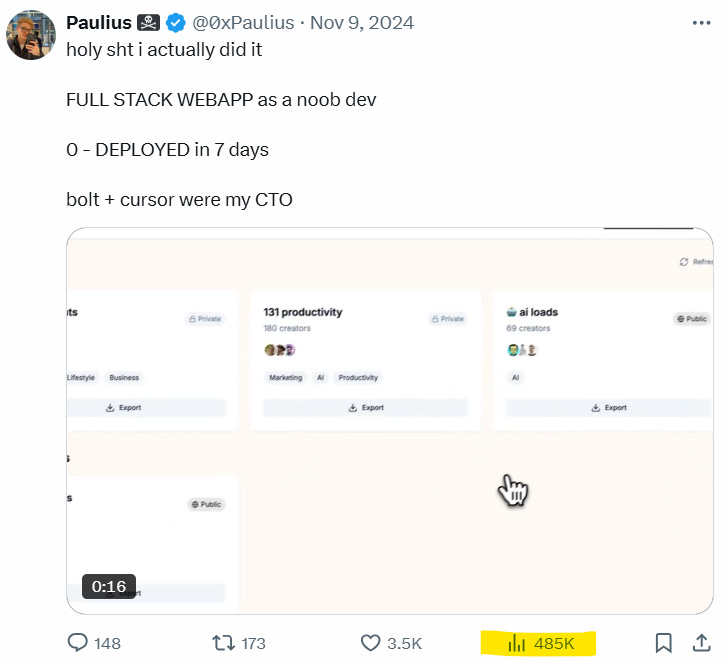
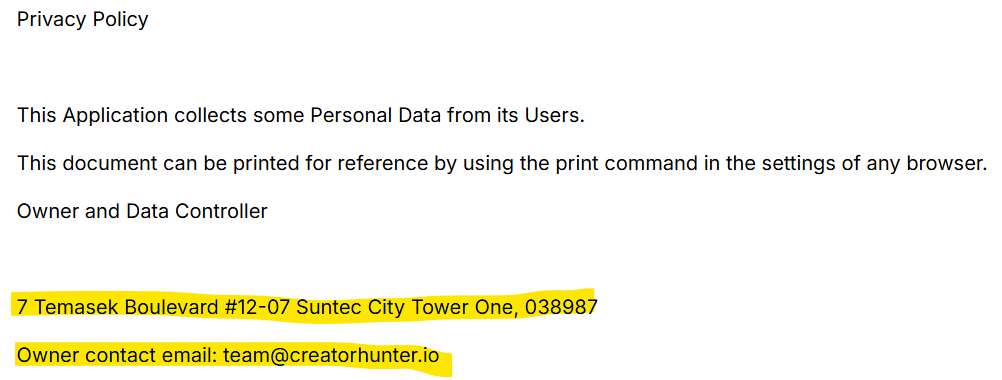
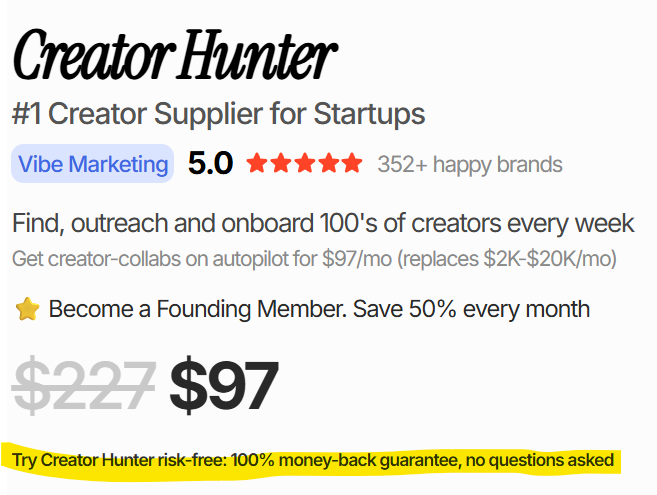
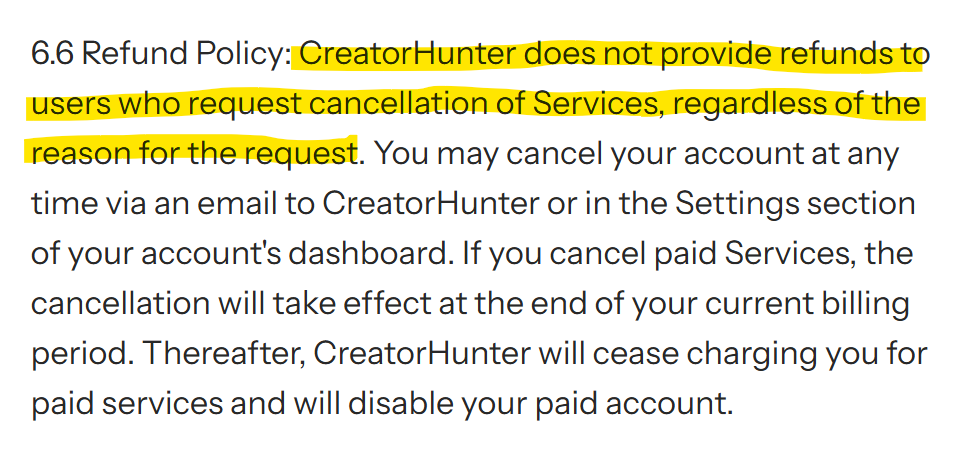

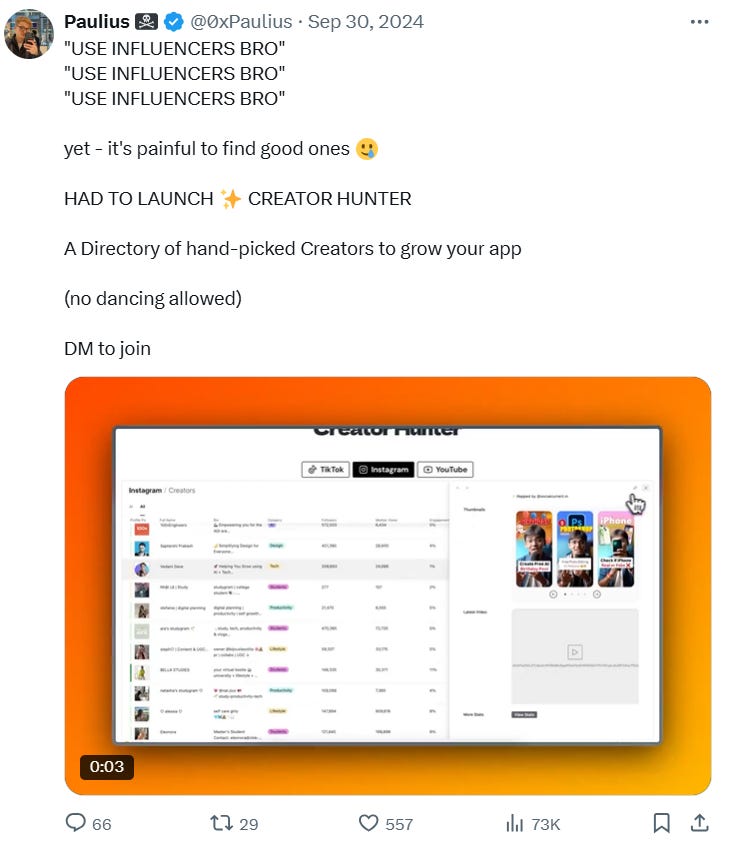
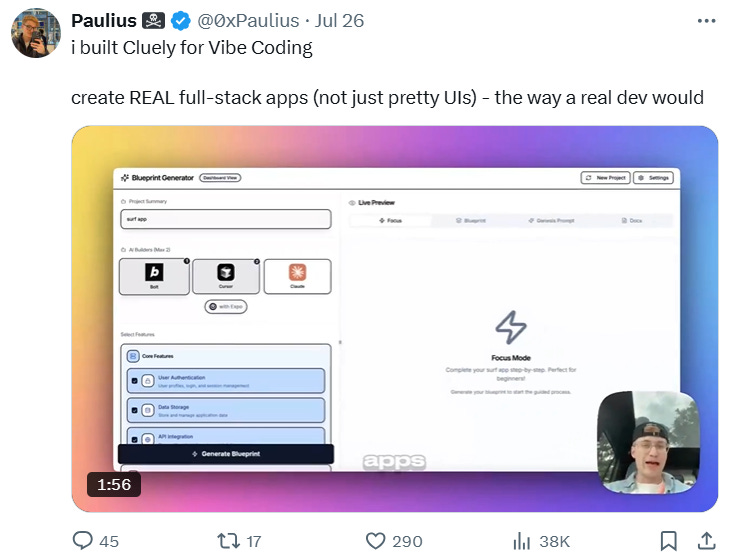
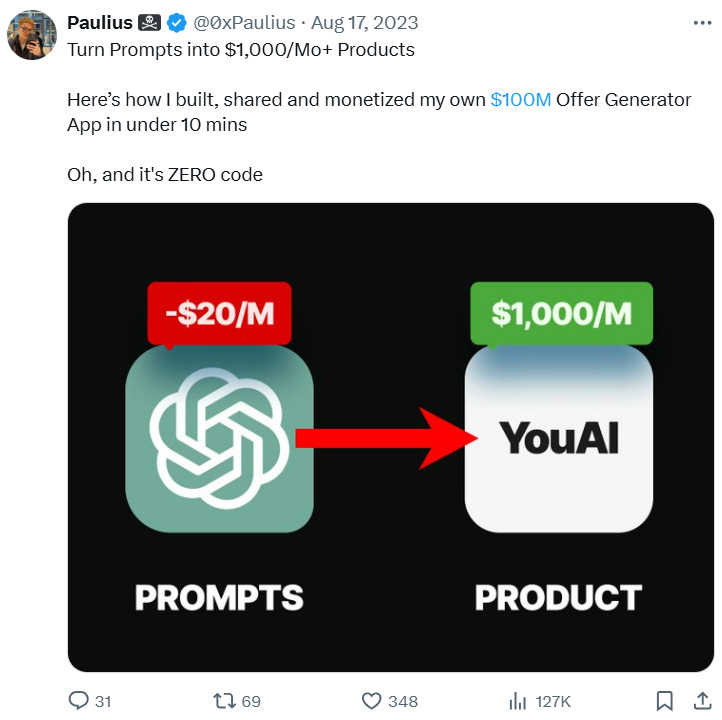


Fun read.
I got AI chat vibes from Paulius and the Starter Storis guy. While conversing with AI, it keeps this enthusiastic tone even when it shouldn't—like when AI can't actually do what you're asking, but still replies "Come back in a few days, and I'll get it done" in some cases. Would you want to work with that kind of fake, shallow positivity where everything gets spun as positive (including the illusion that making a $30k product is easy and that the number is actually "impressive")?
Interestingly, many Starter Storis audience members seem rather critical about this content and aren't easily bullshitted.
@nick_laptev
"Please focus more on how the author found product market fit. This video doesn't cover it, it gives an impression the guy just got viral on Twitter."
@1sndct
"while all the revenue numbers, building while commuting, traveling while the revenue is coming in sound sexy. The boring questions are really the ones that matter the most:
1. How did you identify the opportunity?
2. How did you validate it?
3. How do you distribute?
I feel like the most relevant questions don't get elaborated on enough. One viral tweet is irrelevant, because its not replicable. Even if Paulius himself would want to replicate it, he could not do it on demand."
Sure, using AI tools, it's possible to create valuable software without coding experience—but we're talking prototypes, maybe MVPs, rather than actual products. This hype is just redundant.